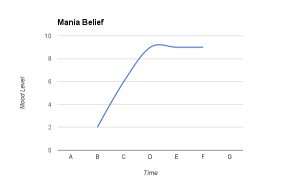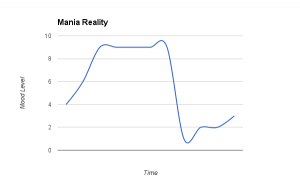I’ve been putting in quite a few hours to get my third eBook ready finished, polished, and ready for launch. The subject matter of my next eBook centers around tearing down the barriers that separate Bipolar people, their Supporters, and loved ones when the situation is not toxic. A big part of working to tear down those barriers is to understand where the person is at on their journey.
Many advocates and Bipolar spaces around the internet trumpet the individual nature of mental illness loudly. That’s true, to an extent. Mental illness is a very personal experience. However, as someone who spent 5 years doing internet marketing work, it is very clear to me that niches exist in our overall demographic. I’ve spent a great deal of time reflecting on how I analyze the situations and people I interact with as a means to best communicate with and reach people.
As a bit of a teaser let me share with you the the niches that I’m referring to as the “Stages of the Journey” with some brief notes.
Stage 1: Lost (Toxic) / Lost (Aware)
Stage 1 is divided into two categories, Lost (Toxic) and Lost (Aware). A Lost (Toxic) individual may be undiagnosed and doing all of the awful things we do to ourselves and others, diagnosed but are unaware of the severity of the problem, or simply don’t give a shit. The Lost (Aware) person has caught glimpses of understanding that there is something wrong with them that needs addressed, but does not understand how to start confronting the problem. This is where we start our journey. Many of us bounce back and forth between the two due to instability and the chaos of life.
Stage 2: Novice
Stage 2 begins when the person understands and accepts that they have a problem, at least some of the time, and they are willing to confront it. Many people do struggle with the idea of having a mental illness. It is very easy for a person at Stage 2 to fall back somewhere into Stage 1. This person needs support, encouragement, and tangible goals to keep them in Stage 2 and looking forward. At this stage, the person is beginning to learn about their mental illness and themselves.
Stage 3: Learner
These individuals don’t struggle as often with their diagnosis. People in Stage 3 are most receptive to information. These people are active participants in pursuing wellness. They not only attend their appointments, but tend to act on whatever practices their mental health professionals are telling them they need to be well. These individuals still need support from time to time, but their needs are less pronounced than previous stages.
Stage 4: Adept
Stage 4 is the last stage. Adept is defined as someone who is reasonably skilled and proficient at a thing. The mentally ill person at Stage 4 has a firm grasp on their mental illness, management, and engages in the practices required to be healthy. This person has likely been through therapy, different doctors, different medications, and more. Ideally, this individual is living a fairly typical life.
I chose Adept to describe the final Stage for a specific reason. One would assume you would end a list with something like “Expert” or “Master.” Right? Not in this case. Because even if the person is an absolute expert on their own diagnosis as it pertains to them, that does not mean that the information is applicable to the next person. I’ve had more than a handful of advocates inform me they were an “expert” on Bipolar Disorder when I pointed out that they were giving bad or misinformation. They’re not, I’m not, you’re not; and you probably won’t be unless you decide to go into psychology and study the work of the doctors that have brought us to our current understanding of a mental illness.
The Adept often suffers from one very major drawback that I’ve seen over and over. They often do not understand that just because they take their medication and go through whatever practices are required to be well now, that they will continue to be well in the future. I’ve seen more than a couple Adepts backslide because they either didn’t know or forgot that the body can grow tolerant to psych medication, which can let the Disorder and an unwell cycle creep back in. The person is often convinced they are totally fine, because they have been fine for years and regularly take their meds. So how can they possibly be unwell now? And then the Disorder further convinces them that they are totally fine and it’s everyone else that is the problem, allowing the unwell cycle to run unchecked.
But What’s the Point?
Effective communication requires understanding one’s target audience. If I’m going to write a romance story, then I need to have a reasonable understanding of how women who read those books think and what they take out of the work. Similarly, I have never had a Lost person tell me my writing was too abrasive, I shouldn’t swear, or inane bullshit like “you should refer to yourself as a person with Bipolar Disorder instead of a Bipolar person.”
On the contrary, I instead get regular feedback like, “your writing is the first that really spoke to me.” Because I’m writing in the tones and language of the way that we think, but do not express, so we don’t have to listen to people bitch at us about it.
Anyway! In my next eBook, I go over these things more in-depth, in addition to methods I use to effectively communicate and build knowledge at the various stages to help people find their way up the ladder. It is my hope that this will allow supporters and their mentally ill loved ones to better dismantle the barriers that inhibit communication; in addition to providing a clearer road map and goals for we mentally ill who are trying to find our way.
The next eBook is still a bit out, but I will keep you posted when it gets closer to release time.
Subscribe to have blog posts and news delivered straight to your Inbox!


